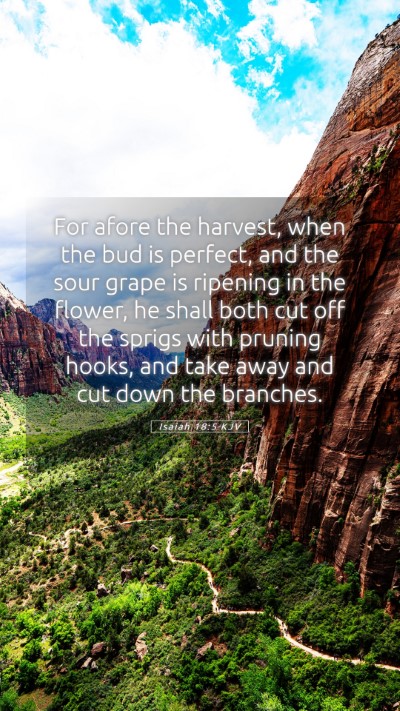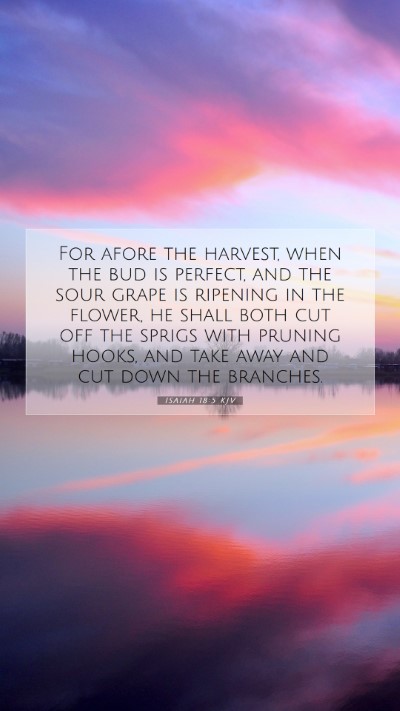Understanding Isaiah 18:5
Isaiah 18:5 states, "For before the harvest, when the bud is perfect and the sour grape is ripening in the flower, he shall both cut off the sprigs with pruning hooks, and take away and cut down the branches." This verse offers rich insights concerning divine judgment, preparation, and the consequences of spiritual neglect.
Overview of the Verse
This passage, set in the context of a prophecy against Cush (modern-day Ethiopia), illustrates the theme of God's sovereignty over nations and the impending judgment that will come upon those who are unfaithful. The imagery of harvest is utilized to convey the idea of timing in God's dealings with humanity.
Insights from Public Domain Commentaries
Matthew Henry's Commentary
Matthew Henry highlights the importance of timing in God's judgments. He explains that the harvest represents the culmination of growth and the point at which God evaluates and prunes His creation. He emphasizes that God's discipline is both necessary and purifying, meant to rid the earth of unrighteousness. Henry views this pruning as a sign of hope for the faithful, suggesting that the cutting off of the unfruitful branches indicates a preparation for future blessing.
Albert Barnes' Notes
Albert Barnes elaborates on the metaphor of the harvest, explaining that it often symbolizes the end of a particular period—the resolute closure when God reckons the actions of nations. He points out that the verse makes a clear distinction between the righteous and the wicked: while the good will flourish, the unrighteous will be cut off before they reach maturity. The vine's buds signify potential that is unfulfilled due to neglect or moral decay, offering a somber warning to nations or individuals who stray from divine mandates.
Adam Clarke's Commentary
Adam Clarke offers a deeper exegesis of the agricultural metaphor, defining the 'sprigs' and 'branches' as symbols of pride and corruption within the nation. Clarke suggests that the imagery indicates not just judgment, but also the cyclical nature of divine cultivation—pruning leads to renewed growth. His analysis leads to an understanding that this verse serves as both a warning and a call to sincere repentance, illustrating God's desire for His people to bear good fruit.
Meaning and Application of Isaiah 18:5
In summary, Isaiah 18:5 serves as a powerful reminder of God's oversight and sovereign control over history. The harvest imagery invites us to reflect on the importance of spiritual growth and the dangers that accompany complacency. As believers, we are encouraged to examine our lives for signs of fruitfulness and heed the call to produce what is good and right in the eyes of God.
Key Themes in Isaiah 18:5
- Divine Judgment: The verse suggests that God periodically assesses the spiritual state of nations and individuals.
- Timing of the Harvest: Reflects on God's perfect timing in dealing with humanity's unrighteousness.
- Spiritual Growth: Encourages self-examination to ensure that believers are producing good fruit.
Cross-References
The meaning of Isaiah 18:5 can be further understood in relation to several other verses:
- John 15:2: "He cuts off every branch in me that bears no fruit." This verse emphasizes the theme of pruning as a necessity for growth.
- Matthew 3:10: "The axe is already at the root of the trees, and every tree that does not produce good fruit will be cut down." This highlights the imminent judgment awaited for unfruitful lives.
- Galatians 6:7-8: "A man reaps what he sows." This emphasizes personal responsibility in spiritual growth and the consequences of negligence.
Conclusion
In conclusion, Isaiah 18:5 provides profound insights into the nature of God's management of unrighteousness and the importance of remaining fruitful in one's spiritual life. These reflections serve as a part of Bible study materials for individuals or Bible study groups looking to deepen their understanding of Scripture. Engaging with this verse through Bible study tools and guides can lead to valuable lessons and insights applicable to our daily lives.


